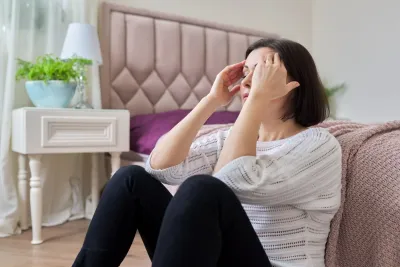Understanding Menopause Dizziness: Causes and Effective Treatments
Sleepme Editorial Team • Jun 09, 2025

Key Takeaways
- Hormonal Fluctuations: Shifting estrogen levels during menopause can disrupt the vestibular system, causing unexpected dizziness or balance issues.
- Common Triggers: Dehydration, hot flashes, anxiety, and poor sleep can all make dizziness worse.
- Lifestyle Fixes: Staying hydrated, cooling down, and managing stress can go a long way in reducing dizzy spells.
- Sleep Connection: Poor sleep can amplify dizziness—making a cool, optimized sleep environment more important than ever.
- When to Act: If dizziness persists or worsens, it’s time to consult a healthcare provider to rule out other underlying causes.
Menopause introduces various physiological changes, among which dizziness is a frequently reported symptom. Grasping the influence of menopausal status on dizziness is crucial for identifying effective treatments.
By uncovering its causes and exploring potential solutions, women can significantly enhance their quality of life during this menopausal transition.
What is Menopausal Dizziness?
Menopausal dizziness shows up as lightheadedness, unsteadiness, or even nausea—and it’s more common than most women realize. The main driver? Shifting hormones. As estrogen levels drop, your nervous system, circulation, and even your inner ear can all get thrown off balance.
To make things trickier, anxiety, heart palpitations, and migraines can pile on, making dizzy spells feel even less predictable.
For example. You’re pouring your morning coffee when the room suddenly tilts—not your espresso’s fault, but menopause throwing off your balance. The upside? These dizzy spells are typically brief and can be kept in check with the right care.is
maintaining this balance becomes more challenging## Causes of Dizziness During Menopause Many women experience dizziness during menopause, and this discomfort can arise from a combination of factors, such as:
Hormonal Fluctuations
Estrogen isn’t just about periods—it also helps keep your inner ear and blood vessels in check. When levels start dipping, both systems can go haywire. The inner ear, which handles balance, may send mixed signals, leaving you feeling unsteady or like the room is spinning.
At the same time, lower estrogen can make blood vessels less responsive, leading to sudden blood pressure drops—especially when you stand up quickly. The result? That woozy, lightheaded feeling no one enjoys.
Blood Sugar and Blood Pressure Variations
Estrogen doesn’t just influence your cycle—it also helps keep blood sugar and blood pressure steady. When levels drop during menopause, that balance gets harder to maintain.
Lower estrogen can make your body less sensitive to insulin, which means blood sugar levels may spike or crash more easily. Either extreme can leave you lightheaded or dizzy.
On top of that, estrogen normally keeps blood vessels flexible and responsive. Without it, your blood pressure can dip suddenly—especially when you stand up fast. That drop, called orthostatic hypotension, briefly cuts blood flow to the brain and brings on that woozy, off-balance feeling.
Tip: Additionally, estrogen typically maintains the flexibility and responsiveness of blood vessels Eating regular, balanced meals and snacks helps smooth out blood sugar swings—and may keep dizziness at bay. Explore some of Emma's recipes to help you embrace change.
Sleep Disturbances
Night sweats and hot flashes don’t just ruin your sheets—they wreck your sleep. When your body keeps waking up to cool down, quality rest suffers. That sleep debt piles up fast, leaving you dragging through the day.
When you sleep hot, you're deprived of adequate sleep, your brain and nervous system are less efficient at processing information and maintaining balance, making you more likey to feeling lightheaded or unsteady.
Menopause Symptoms Stealing Your Sleep?
The Chilipad is here! Designed to help women going through menopause get the restful, uninterrupted sleep they deserve, it lets you take control of your bed temperature—no more tossing, turning, or sweating through the night. Reclaim your nights and wake up refreshed. Try Chilipad and feel the difference tonight.
Other Factors Contributing to Menopause Dizziness
If you're experiencing dizziness during menopause, it's helpful to know that it can stem from more than just hormonal shifts.
Here are some other potential causes:
- Anxiety: Anxiety is a common menopause symptom that can significantly contribute to dizziness. Studies have shown that women experiencing anxiety are more likely to report dizzy spells. [1]
- Heart Palpitations: Affecting up to 47% of peri- and postmenopausal women, heart palpitations can also lead to feelings of dizziness and unsteadiness.
- Migraines: Migraines, which impact up to 29% of women during menopause, are another potential cause of dizziness. [2]
- Benign Paroxysmal Positional Vertigo (BPPV): This inner ear disorder can cause vertigo symptoms, with perimenopausal women being particularly prone to developing BPPV. [3]
- Meniere’s Disease: This condition, which involves an abnormal buildup of fluid in the inner ear, can also trigger vertigo and dizziness.

Managing Menopausal Dizziness
Dizziness during menopause can throw you off balance—literally. But the good news? There are smart, practical ways to manage your symptoms and keep that lightheaded feeling in check. Here’s what can help:
- Staying Hydrated: Drinking plenty of water helps prevent dehydration, a common cause of dizziness.
- Eating Small, Healthy Meals: Keeping blood sugar levels stable by eating regular, balanced meals can reduce dizzy spells.
- Avoiding Caffeine and Alcohol: Both caffeine and alcohol can exacerbate dizziness and should be consumed in moderation or avoided.
- Exercising Regularly: Physical activity improves cardiovascular health and balance, which can help mitigate dizziness.
- Practicing Relaxation Techniques: Techniques such as deep breathing or meditation can reduce anxiety, a known contributor to feeling dizzy.
- Considering Hormone Replacement Therapy (HRT): HRT can help alleviate hormonal fluctuations and reduce dizziness symptoms. However, it’s important to consult with a healthcare provider to discuss the benefits and risks.
- Improve Sleep Quality: Sleeping cooler, especially with a Chilipad cooling mattress topper, can significantly alleviate common menopause symptoms by regulating body temperature.
The Chilipad
- Chilipad Dock Pro: Our best cooling mattress topper and smartest system yet! Faster, quieter, and fully app-controlled with Wi-Fi. Its tubeless pad and advanced water cooling tech bring high-performance comfort straight to your bed.
- Chilipad Cube: A simpler, remote-controlled solution that still delivers the same 55°F to 115°F temperature range. This original cooling mattress topper uses a traditional water-tube design and is a great entry-level choice for anyone looking to improve their sleep environment without all the extra tech.
Best night of sleep since menopause - the chill pad rocks!! - Wendy (Trustpilot Review)
Medical Treatments
For persistent dizziness, medical interventions may be necessary. During the menopause transition, medical interventions may be necessary to manage severe dizziness.
- Hormone Replacement Therapy: Hormone therapy can stabilize hormonal fluctuations, potentially alleviating dizziness. It's important to consult with a healthcare provider to carefully weigh the benefits and potential risks.
- Alternative Supplements: Some find relief using supplements like black cohosh or ginseng, though their efficacy varies. Always speak with your healthcare provider before starting any supplement regimen.
When to Seek Medical Attention
If you’re experiencing severe or persistent menopause symptoms, including dizziness or other symptoms, it’s important to speak to your doctor. Dizziness can sometimes be linked to underlying heart conditions or other medical concerns. If you experience any of the following common symptoms, seek medical attention immediately:
- Chest pain or shortness of breath
- Severe headache or confusion
- Sudden loss of balance or coordination
- Numbness or weakness in the face, arm, or leg
- Difficulty speaking or swallowing
These menopausal symptoms could indicate a more serious condition that requires prompt medical evaluation and treatment.
You Can Decrease Dizziness Symptoms
Menopausal dizziness arises from a combination of hormonal shifts, blood sugar and pressure changes, sleep disruptions, anxiety, and inner ear issues. Managing it involves lifestyle changes like balanced meals, hydration, and exercise.
For persistent dizzy spells, it's best to consult your doctor about medical options. Seek immediate medical help for severe symptoms like chest pain or sudden loss of balance. Understanding these causes and treatments empowers women to improve their well-being during menopause.
Frequently asked questions
Why Do I Feel Dizzy During Menopause?
Dizziness during menopause can be caused by:
- Hormonal Fluctuations: Changes in estrogen levels can impact blood pressure, circulation, and the inner ear, leading to dizziness.
- Dehydration: Not drinking enough water can lower blood volume and cause lightheadedness.
- Anxiety and Stress: Hormonal shifts can increase anxiety, which may trigger dizziness.
- Blood Sugar Imbalances: Fluctuations in blood sugar levels can contribute to feeling lightheaded or dizzy.
Can Menopause-Related Dizziness Affect Sleep?
Yes, and it's a double whammy. Dizziness can make it tough to fall asleep or stay asleep, while poor sleep can make dizziness worse. It’s a frustrating cycle, but treatable.
How Do I Know If My Dizziness Is Due to Menopause?
If you're in perimenopause or menopause and notice dizziness alongside other common symptoms like hot flashes, night sweats, or mood swings, it could be hormone-related. Always rule out other causes with your doctor.
What Are Effective Ways to Manage Menopause-Related Dizziness?
- Stay hydrated and avoid caffeine and alcohol
- Eat regular, balanced meals
- Manage stress with mindfulness or yoga
- Keep your sleep environment cool and consistent
- Talk to your doctor about hormone therapy or other treatments








